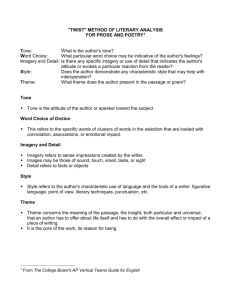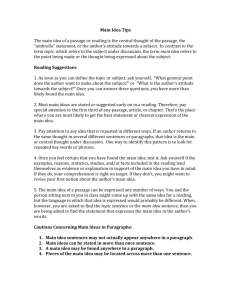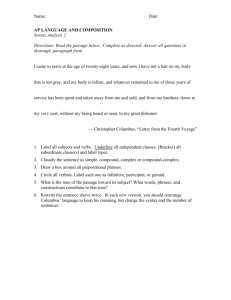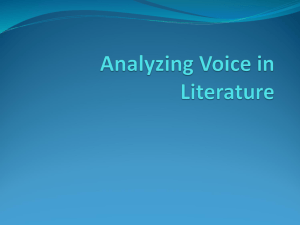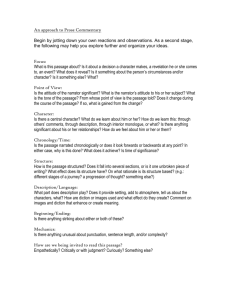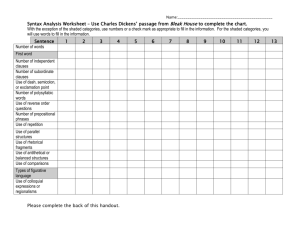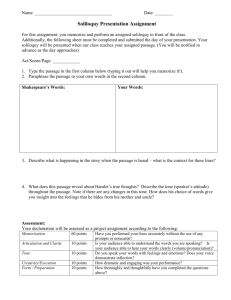Consider - msjustice
advertisement
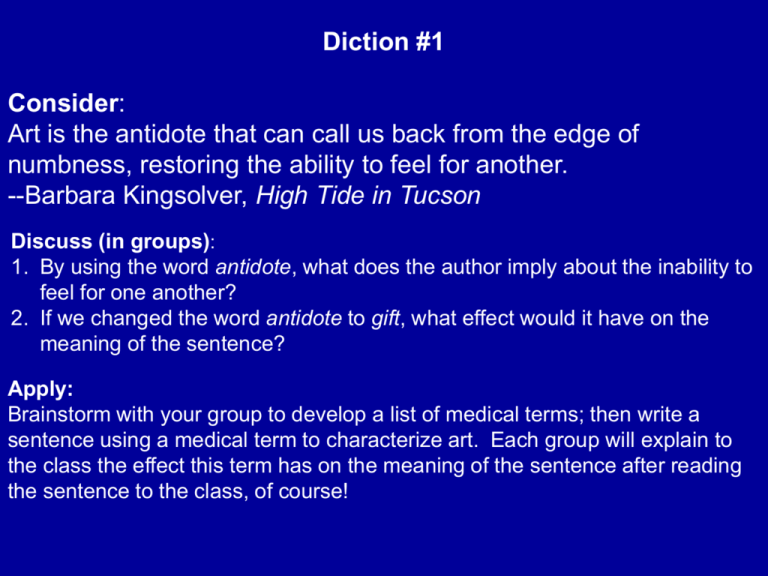
Diction #1 Consider: Art is the antidote that can call us back from the edge of numbness, restoring the ability to feel for another. --Barbara Kingsolver, High Tide in Tucson Discuss (in groups): 1. By using the word antidote, what does the author imply about the inability to feel for one another? 2. If we changed the word antidote to gift, what effect would it have on the meaning of the sentence? Apply: Brainstorm with your group to develop a list of medical terms; then write a sentence using a medical term to characterize art. Each group will explain to the class the effect this term has on the meaning of the sentence after reading the sentence to the class, of course! Diction #2 Consider: As I watched, the sun broke weakly through, brightened the rich red of the fawns, and kindled their white spots. --E.B. White, “Twins,” Poems and Sketches of E.B. White Discuss: 1. What kind of flame does kindled imply? How does this verb suit the purpose of the sentence? 2. Would the sentence be strengthened or weakened by changing the sun broke weakly through to the sun burst through? Explain the effect this change would have on the verb kindled. Apply: Brainstorm a list of action verbs that demonstrate the effects of sunlight. Diction #3 Consider: An aged man is but a paltry thing A tattered coat upon a stick . . . --W. B. Yeats, “Sailing to Byzantium” Discuss: 1. What picture is created by the use of the word tattered? 2. By understanding the connotations of the word tattered, what do we understand about the persona’s attitude toward an aged man? Apply: List three adjectives that can be used to describe a pair of shoes. Each adjective should connote a different feeling about the shoes. Diction #4 Consider: The man sighed hugely. --E. Annie Proulx, The Shipping News Discuss: 1. What does it mean to sigh hugely? 2. How would the meaning of the sentence change if we rewrote it as: The man sighed loudly? Apply: Fill in the blank below with an adverb: The man coughed ____________________________. Your adverb should make the cough express an attitude. For example, the cough could express contempt, desperation, or propriety. Do not state the attitude; instead, let the adverb imply it. Diction #5 Consider: A rowan* like a lipsticked girl. * a small deciduous tree native to Europe, having white flower clusters and orange berries ---Seamus Heaney, “Song,” Field Work Discuss: 1. Other than the color, what comes to mind when you think of a lipsticked girl? 2. How would it change the meaning and feeling of the line if, instead of lipsticked girl, the author wrote girl with lipstick on? Apply: Write a simile comparing a tree with a domesticated animal. In your simile, use a word that is normally used as a noun (like lipstick) as an adjective like lipsticked). Imagery (#1) Consider: The many men, so beautiful! Within the shadow of the ship I watched their rich attire: And they all dead did lie: Blue, glossy green, and velvet black, And a thousand thousand slimy things They coiled and saw; and every track Was a flash of golden fire Lived on; and so did I. Discuss: 1. These stanzas from “The Rime of the Ancient Mariner” show the Mariner’s changing attitude toward the creatures of the sea. What is the Mariner’s attitude in the first stanza? What image reveals this attitude? 2. What is the Mariner’s attitude in the second stanza? Analyze the imagery that reveals this change. Apply: Think of a cat or a dog you can describe easily. First write a description which reveals a positive attitude toward the animal. Then write one about the same animal which reveals a negative attitude. Use imagery rather than descriptions. Imagery (2) Consider: She looked into the distance, and the old terror flamed up for an instant, then sank again. Edna heard her father’s voice and her sister Margaret’s. She heard the barking of an old dog that was chained to the sycamore tree. The spurs of the cavalry officer clanged as he walked across the porch. There was the hum of bees, and the musky odor of pinks filled the air. Discuss: 1. Although the narrator “looks into the distance,” the images are primarily auditory. What are the auditory images in the passage? What mood do these images create? 2. The last sentence of this passage contains an olfactory image (the musky oder of pinks fill the air). What effect does the use of an olfactory image, after a series of auditory images, have on the reader? Apply: Write a paragraph in which you create a scene through auditory imagery. The purpose of your paragraph is to create a calm, peaceful mood. Use one olfactory image to enhance the mood created by auditory imagery. Imagery (3) Consider: It was a mine town, uranium most recently. Dust devils whirled sand off the mountains. Even after the heaviest of rains, the water seeped back into the ground, between stones, and the earth was parched again. Discuss: 1. What feelings do you associate with images of dusty mountains and dry earth? 2. There are two images associated with land in the third sentence. Identify the two images and compare and contrast the feelings these images evoke. Apply: Write a sentence describing a rainstorm using imagery that produces a positive response; then write a sentence describing a rainstorm with imagery that produces a negative response. Share your sentences with the class. Briefly discuss how the images create the positive and negative responses. Imagery (4) Consider: At first I saw only water so clear it magnified the fibers in the walls of the gourd. On the surface, I saw only my own round reflection. The old man encircled the neck of the gourd with his thumb and index finger and gave it a shake. As the water shook, then settled, the colors and lights shimmered into a picture, not reflecting anything I could see around me. There at the bottom of the gourd were my mother and father scanning the sky, which was where I was. --Maxine Hong Kingston, The Woman Warrior • Discuss: • 1. What kind of imagery is used in the passage? • 2. Compare and contrast the imagery of the last sentence with the imagery of the first four sentences. • Apply: • Write a sentence which uses precise visual imagery to describe a simple action. Imagery (#5) Consider: I also enjoy canoeing, and I suppose you will smile when I say that I especially like it on moonlit nights. I cannot, it is true, see the moon climb up the sky behind the pines and steal softly across the heavens, making ashining path for us to follow; but I know she is there, and as I lie back among the pillows and put my hand in the water, I fancy that I feel the shimmer of her garments as she passes. Sometimes a daring little fish slips between my fingers, and often a pond-lily presses shyly against my hand. Frequently, as we emerge from the shelter of a cover or inlet, I am suddenly conscious of the spaciousness of the air about me. A luminous warmth seems to enfold me. ---Helen Keller, The Story of My Life Discuss: 1. Since Keller was blind and deaf, tactile imagery becomes a focus in her writing. List the tactile images in this passage. 2. Which images in the passage are more specific: visual or tactile? Support your answers with reference to the passage. Apply: Close your eyes and touch a familiar object. Write a description of how it felt. Detail #1 Consider: Whenever he was so fortunate as to have near him a hare that had been kept too long, or a meat pie made with rancid butter, he gorged himself with such violence that his veins swelled, and the moisture broke out on his forehead. --Thomas Babington Macaulay, “Samuel Johnson” Discuss: 1. What effect does the detail (the spoiled hare, the rancid butter, the swollen veins, the sweaty forehead) have on the reader? 2. How would the meaning of the sentence be changed by ending it after himself? Apply: Write a sentence describing someone with disgusting eating habits. It must be one, correct sentence, and it must contain at least three vivid details. Detail #2 Consider: An old man, Don Tomasito, the baker, played the tuba. When he blew into the huge mouthpiece, his face would turn purple and his thousand wrinkles would disappear as his skin filled out. --Alberto Alvaro Rios, “The Iguana Killer” Discuss: 1. The first sentence is a general statement. How does a second sentence enrich and intensify the first? 2. Contrast the second sentence with the following: When he blew the tuba, his face turned purple and his cheeks puffed out. Apply: Describe someone jumping over a puddle. Your first sentence should be general, stating the action simply. Your second sentence should clarify and intensify the action through detail. Detail #3 • Consider: • To those who saw him often he seemed almost like two men: one the merry monarch of the hunt and banquet and procession, the friend of children, the patron of every kind of sport; the other the cold, acute observer of the audience chamber or the Council, watching vigilantly, weighing arguments, refusing except under the stress of great events to speak his own mind. – --Winston Churchil, "King Henry VIII" Discuss: 1. Churchill draws attention to the contrasting sides of Henry VIII through detail. How is the impact of this sentence strengthened by the order of the details' presentation? 2. What is Churchill's attitude toward Henry? What specific details reveal this attitude? Apply: Think of someone you know who has two strong sides to his/her personality. Using Churchill's sentence as a model, write a sentence which captures--through detail--these two sides. Detail #4 Consider: The dog stood up and growled like a lion, stiff-standing hackles, teeth uncovered as he lashed up his fury for the charge. Tea Cake split the water like an otter, opening his knife as he dived. The dog raced down the backbone of the cow to the attack and Janie screamed and slipped far back on the tail of the cow, just out of reach of the dog's angry jaws. ---Zora Neale Hurston, Their Eyes Were Watching God Discuss: 1. Which details reveal that the dog has rabies? What effect do these details have on the reader? 2. Contrast the details used to describe Tea Cake (the male protagonist) and Janie (the female protagonist). What do these details reveal about the author's attitude toward these two characters? Apply: Think of two contrasting characters. Write a sentence for each showing their reaction to a fight. Do not explain the different reactions; instead, show the different reactions through use of detail. Detail #5 Consider: The truck lurched down the goat path, over the bridge and swung south toward El Puerto. I watched carefully all that we left behind. We passed Rosie’s house and at the clothesline right at the edge of the cliff there was a young girl hanging out brightly colored garments. She was soon lost in the furrow of dust the truck raised. ---Rudolfo Anaya, Bless Me, Ultima Discuss: 1. List the words that provide specific detail and contribute to the power of the passage. 2. Contrast the third sentence with: We passed Rosie’s house and saw a girl hanging out the clothes. Explain the difference in impact. Apply: Rewrite the passage eliminating the specific detail. How does the absence of detail change the meaning of the passage? Syntax #1 Consider: The impact of poetry is so hard and direct that for the moment there is no other sensation except that of the poem itself. What profound depths we visit then— how sudden and complete is our immersion! There is nothing here to catch hold of; nothing to stay us in our flight…The poet is always our contemporary. Our being for the moment is centered and constricted, as in any violent shock of personal emotion. ---Virginia Woolf, “How Should One Read a Book?” Discuss: 1. Woolf uses a variety of sentence types in this selection. Among them is the exclamatory sentence. Identify the exclamatory sentence and explain its effect. 2. Classify each sentence as to length: short, medium, or long. How is the meaning of the passage reinforced and clarified by sentence length? Apply: Write a declarative sentence about college entrance examinations. Then write an exclamatory sentence which amplifies or clarifies the declarative one. Syntax #2 Consider: Brother, continue to listen. You say that you are sent to instruct us how to worship the Great Spirit agreeably to his mind; and , if we do not take hold of the religion which you white people teach, we shall be unhappy hereafter. You say that you are right and we are lost. How do we know this to be true? ---Chief Red Jacket, “Chief Red Jacket Rejects a Change of Religion” Discuss: 1. The words you say are repeated several times in the sentence. What is the repetition’s function? 2. The question at the end of the passage is rhetorical. What attitude toward the audience is expressed by the use of a rhetorical question? Apply: Write a three-sentence paragraph modeled after Chief Red Jacket’s passage. The first two sentences should contain repetition; the third sentence should be a rhetorical question. Your topic is school uniforms. Syntax #3 Consider: No sooner had the reverberation of my blows sunk into silence, then I was answered by a voice from within the tomb! –by a cry, at first muffled and broken, like the sobbing of a child, and then quickly swelling into one long, loud, and continuous scream, utterly anomalous and inhuman—a howl—a wailing shriek, half of horror and half of triumph, such as might have arisen only out of hell, conjointly from the throats of the damned in their agony and of the demons that exult in the damnation. Edgar Allan Poe, “The Black Cat” Discuss: 1. The dashes in this long sentence set off a series of appositives. What noun phrase is explained by the appositives? 2. This sentences makes syntactic and semantic sense if it ends with the first exclamation point. What do the appositives add to the meaning and effectiveness of the sentence? Apply: Rewrite Poe’s sentence, changing it into a series of short sentences. How does the use of short sentences change the overall meaning of the original? Syntax #4 Consider: The seven years’ difference in our ages lay between us like a chasm: I wondered if these years would ever operate between us as a bridge. ---James Baldwin, “Sonny’s Blues” Discuss: 1. What function does the colon serve in this sentence? 2. How would the meaning and impact of the sentence change if the sentence read as follows: The seven years’ difference in our ages lay between us like a chasm, and wondered if these years would ever operate between us as a bridge. Apply: Write two independent clauses; join the two with a colon, giving emphasis to the independent clause which follows the colon. Use Baldwin’s sentence as a model. Syntax #5: Consider: I slowed still more, my shadow pacing me, dragging its head through the weeds that hid the fence. ----William Faulkner, The Sound and the Fury Discuss: 1. In this sentence, form imitates meaning. How does Faulkner slow the sentence down, reinforcing the sentence’s meaning? 2. How would the impact of the sentence change if we rewrote the sentence to read: I slowed still more. My shadow paced me and dragged its head through the weed-obscured fence. Apply: Using Faulkner’s sentence as a model, write a sentence that expresses reluctance. Use at least two phrases and one subordinate clause to reinforce the meaning of your sentence. Explain how your syntax reinforces your meaning. Syntax #7 Consider: I hear an army charging upon the land, And the thunder of horses plunging, foam about their knees: Arrogant, in black armor, behind them stand, Disdaining the reins, with flutering whips, the charioteers. ---James Joyce, "I Hear an Army Charging Upon the Land" Discuss: 1. The subject of the verb stand in line 3 is charioteers at the end of line 4. How does this inversion of the normal word order (subject-verb) affect the impact of those lines? 2. Examine the adjectives and adjective phrases in lines 3 and 4: arrogant , in black armour. What word do these adjectives modify? How does this unusual word order affect the impact of the lines? Apply: Write a sentence about a car crash. In your sentence, invert the normal order of subject and verb. Try to make your sentence sound natural and powerful. Share your sentence with a partner. Syntax #8 Consider: "I'm clean, Carlito, I'm not using." My voice dropped to a whisper. "I'm not using." And oh, God, I found my mind, thinking, Wonder what it would be like again? Wonder what it would be like again? Wonder what it would be like again? Wonder. . . ---Piri Thomas, Down These Mean Streets Discuss: 1. Thomas repeats the question Wonder what it would be like again? three times in the passage. What effect does this repetition have on the impact of the passage? 2. At the end of the passage, Thomas uses ellipses to indicate an omission of words required for complete syntactical construction but unnecessary for understanding. What words are missing? What impact does this omission have on the passage? Apply: Imagine that you are very hungry and are on the way to the best restaurant in town. Describe what you feel as you anticipate a great dinner. In your description use questions and ellipses, as Thomas does. Share your description with the class and explain the impact the questions and ellipses have on the description. Tone #1 Consider: It's true. If you want to buy a spring suit, the choice selection occurs in February; a bathing suit, March; back-to-school clothes, July; a fur coat, August. Did I tell you about the week I gave in to a mad-Mitty desire to buy a bathing suit in August? The clerk, swathed in a long-sleeved woolen dress which made her look for the world like Teddy Snowcrop, was aghast. "Surely, you are putting me on," she said. "A bathing suit! In August!" "That's right," I said firmly,"and I am not leaving this store until you show me one." She shrugged helplessly. "But surely you are aware of the fact that we haven't had a bathing suit in stock since the first of June. Our--no offense--White Elephant sale was June third and we unload--rather, disposed of all of our suits at that time." ---Erma Bombeck, At Wit's End Discuss: 1. What is the attitude of the writer toward the subject matter? 2. What diction and details does Bombeck use to express this attitude? In other words, what diction and details create the tone of the passage? Tone #2 Consider: It's his first exposure to Third World passion. He thought only Americans had informed political opinion--other people staged coups out of spite and misery. It's an unwelcome revelation to him that a reasonably educated and rational man like Ro would die for things that he, Brent, has never heard of and would rather laugh about. Ro was tortured in jail. Franny has taken off her earphones. Electrodes, canes, freezing tanks. He leaves nothing out. Something's gotten into Ro. Dad looks sick. The meaning of Thanksgiving should not be so explicit. --Bharati Mukherjee, "Orbiting" Discuss: 1. What is the narrator's attitude toward Brent (Dad)? Cite your evidence. 2. How does the syntax in this passage help create the tone? Apply: Rewrite the last five sentences in the paragraph, making the five short sentences into two longer sentences. Read your rewritten sentences to a partner and discuss how the longer sentences affect the tone of the passage. Tone #3 Consider: Microphone feedback kept blaring out the speaker's words, but I got the outline. Withdrawal of our troops from Vietnam. Recognition of Cuba. IMmediate commutation of student loans. Until all these demands were met, the speaker said he considered himself in a state of unconditional war with the United States government. I laughed out loud. ---Tobias Wolf, "Civilian" Discuss: 1. What is the attitude of the narator toward the political speaker in this passage? How do you know? 2. How does the use of a short, direct sentence at the end of the passage (I laughed out loud.) contribute to the tone? Apply: Substitute a new sentence for I laughed out loud. Your new sentence should express support for the political speaker. Read the passage--with your new sentence--and explain how your sentence changes the tone of the passage. Tone #4 Consider: What a thrill-My thumb instead of an onion. The top quite gone Except for a sort of a hinge Of skin, A flap like a hat, dead white. Then a red plush. Discuss: 1. What is the poet's attitude toward the cut? What words, images and details create the tone? 2. In the second stanza, Plath uses colors to intensify the tone. The flap of skin is dead white, the blood is a red plush. What attitude toward the cut and, by implication, toward life itself, does this reveal? Apply: Write a short description of an automobile accident. Create a tone of complete objectivity with no emotional reaction. What details, images, and diction create your tone? Tone #5: There is no drop of water in the ocean, not even in the deepest parts of the abyss, that does not know and respond to the mysterious forces that create the tide. No other force that affects the sea is so strong. Compared with the tide the wind-created waves are surface movements felt, at most, no more than a hundred fathoms below the surface. --Rachel Carson, The Sea Around Us Discuss: 1. What is Carson's attitude toward the tide? 2. Carson uses negative constructions several times in this paragraph ("There is no. . ., not even in the ..., that does not know..., No other force..."). Yet her tone is uniformly positive and reverential. How does the use of negatives create such a positive tone? Apply: Rewrite the first sentence of the passage, changing all of the negative constructions to positive ones. What effect does it have on the tone?
